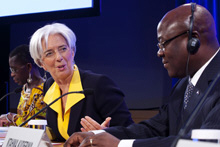
Typical street scene in Santa Ana, El Salvador. (Photo: iStock)
IMF Survey: ‘African Hope,’ but Continent Faces Challenges Too—Lagarde
April 22, 2012
- Oil, commodity-price spikes among potential shocks for African economies
- More financing for concessional loans for low-income countries next priority
- Africa’s policymakers agree medium-term goals for growth, jobs
African hopes for broader progress face challenges too, with several potential shocks that could affect the continent, IMF Managing Director Christine Lagarde said.

African Consultative Group’s Kuderwa (r), IMF’s Lagarde: uncertainties facing African countries reflect uncertainties in advanced economies (IMF photo)
AFRICAN CONSULTATIVE GROUP
She told a news conference during the IMF-World Bank Spring Meetings in Washington D.C. that her next fund-raising priority was the topping up of the IMF’s resources that finance low-interest loans to low-income countries.
Lagarde was speaking after a meeting of the African Consultative Group, formed in 2007 to enhance the IMF’s policy dialogue with its African member countries. She noted that the IMF forecasts growth for the whole of Africa of about 4 percent for 2012 and 2013, with the continent’s low-income countries are expected to grow by about 5 percent for the same periods.
“I mentioned a couple of days ago the dark clouds on the horizon—well there is certainly African hope on the horizon as well,” Lagarde said.
Potential shocks
Lagarde noted that the group had discussed potential shocks that could affect African economies, including higher oil prices and more volatile commodity prices, and any resurgence of the euro area crisis. Those shocks would clearly slow growth, cool demand, cut aid, and reduce remittances.
“We concluded that those countries that have sufficient reserves and fiscal space should be able to ease macroeconomic policies to support demand. For other countries that do not have such fiscal room to maneuver, they will have to strengthen their positions and seek external funding if necessary,” Lagarde said.
Turning to how the IMF can further help African countries, Lagarde said she is also pushing on fund-raising—following IMF members’ pledges of more than $430 billion to boost the institution’s total lending power—to replenish the Poverty Reduction and Growth Trust. The trust provides resources to finance IMF low-interest loans to low-income countries. Members had agreed to use some of the profits from recent gold sales to put into that trust and now must complete the process.
“We need more money in that trust if we want to finance concessional loans for low-income countries,” Lagarde stated. “So that will be my goal for the next few months: make sure that we replenish it; that there are more contributors and more dollars. We have had indications that some countries are considering, which is good.”
African Caucus Acting Chairman Ntahwa Kuderwa told reporters that uncertainties facing African countries mainly reflected uncertainties in advanced economies, and the rise in global oil prices.
Resilient African economies
Kuderwa noted that African economies had to date displayed resilience to the effects of the economic problems in advanced economies. “But, looking ahead, African economies may decline if not adequately prepared to face shocks such as the drought in the Sahel and the slowdown in emerging market economies,” Kuderwa said.
A number of African economies would need external assistance in the event of serious shocks to their economies, and it was important to strengthen IMF resources so that the institution could help all its members, Kuderwa added.
In a statement, the consultative group said “African policymakers agreed that—over the medium-term—further improvements in the business climate, labor markets, governance and public sector service delivery would be essential to generate sustained growth, employment, and address income inequalities.”
The group’s statement echoed African finance ministers who, at an April 21 Washington news conference, said a better African business climate could soften the impact on the continent of global crises.







